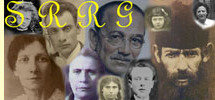

Shmuel Yosef AGNON
Submitted by Norbert Porile
Shmuel Yosef Agnon was the first Hebrew language writer to win the Nobel prize in literature. He was born in Buchach in 1888. His father, whose family name was Czaczkes, was a fur merchant and a follower of the Hasidic Rebbe of Chórtkow. Agnon grew up under a strong Hasidic and rabbinical influence and received private schooling in Yiddish and Hebrew. He started writing in these two languages before he was 10 years old and published his first poem at age 15. He published numerous short stories and poems in his early years. In 1907 he left Buchach for Palestine and lived in both Jaffa and Jerusalem. He first used the pseudonym "Agnon" in Ha-Omer, his first story published in Palestine, and adopted it as his family name in 1924. Once he left Buchach he stopped writing in Yiddish and wrote mostly in Hebrew. He spent the years from 1913 to 1924 in Germany, where he edited the Juedischer Verlag. He lived mostly in Berlin, where he associated with Jewish scholars and Zionists. Many of his stories of that period were set in the world of pious Polish Jews, but most of his manuscripts were destroyed in a fire and were never published. Agnon returned to Jerusalem in 1924 and began his most creative period shortly thereafter. His work dealt with major contemporary spiritual concerns, with the disintegration of traditional ways of life, and with the loss of faith and identity. Among his major works are The Bridal Canopy, published in 1937, a folk epic that became a cornerstone of modern Hebrew literature, and A Guest for the Night, published in 1939 following serialization in Haaretz. This book bears witness to the desolation of a town in Galicia upon the narrator's return after an absence of many years, and may have been inspired by Agnon's visit to Buchach in 1930. His greatest novel is considered to be Ternol Shileshom, published in 1945. The novel is set in Palestine at the time of the 2nd Aliyah and deals with the effect of the Holocaust on the unfolding events. Agnon's collected works were published in 1953 in a 7-volume edition, including novels, short stories, poems, and folktales. This event did not end his writing and he continued to be active. Thus. at this time he wrote a number of stories dealing with life in Buchach. Also see A Book That Was Lost and Other Stories. Agnon received numerous honors for his work. He won the Israel Prize in both 1954 and 1958, and was awarded the Nobel Prize in 1966. He died in 1970.This page is hosted at no cost to the public by JewishGen, Inc., a non-profit corporation. If you feel there is a benefit to you in accessing this site, your JewishGen-erosity is appreciated.
Last updated 06/01/03 by ELR
Copyright © 2003 SRRG